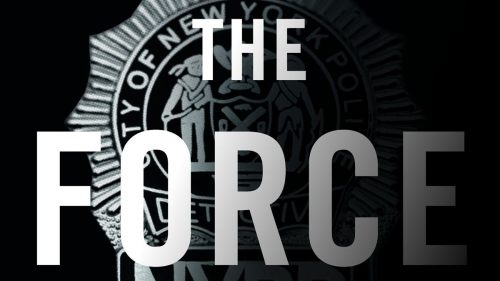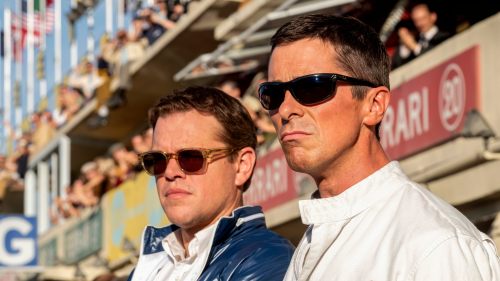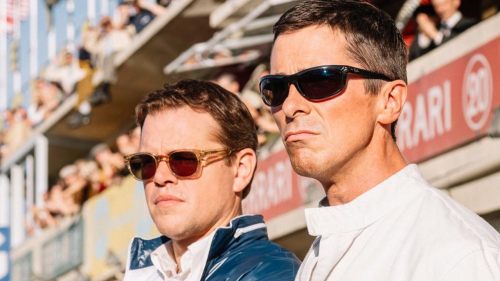THE GREAT WALL Review: Matt Damon Kills Dragons And Individualism
Zhang Yimou has created something strange with The Great Wall, a film not quite befitting of a simple “good” or “bad” label but one ultimately worth your attention. It's an idiosyncratic product of American and Chinese interests, drenched in colour and mysticism while offering just enough peeks into a fantasy world, just enough eye-popping, audacious design, and just enough semblance of character to function, hovering somewhere on the border of blockbuster entertainment and state propaganda.
That alone should be enough to sell you on it.
Matt Damon and Pedro Pascal play unkempt westerners William and Tovar, mercenaries on a mission to steal the secrets of gunpowder. Their midnight encounter with an unseen creature leaves them with a dead crew, a severed dragon talon, and whole lot of explaining to do when they stumble upon the world’s longest military outpost, led in part by Jing Tian’s Commander Lin Mae. Contrary to what the trailers would have you believe, this is as much Pascal and Jing’s film as it is Matt Damon’s. He isn’t a white saviour despite having the unmistakable sheen of one (this is an Edward Zwick script, after all), he’s more of a co-saviour, really. There is an equitable distribution of saving to go around, and William’s broader function despite his God-like marksmanship is to gawk at the superiority of the Chinese forces.
Just how superior are we talking? In order to defend against these dragon creatures once every few decades, the Wall’s regiments are colour-coded; archers in red, foot soldiers in black, mêlée weaponers in purple, and the pièce de résistance in the brightest of blue: Lin’s all-female Crane Trooper battalion, fearlessly descending via manned bungee cords and impaling the oncoming invaders one at a time. The western bandits are thrust into this siege instantaneously, going from bound prisoners to unwitting warriors in a battle they have no stake in. This isn’t a problem at first. Watching Damon and Pascal struggle to find literal and moral footing is part of the fun, but the stakes do remain somewhat ill-defined for the majority of the film. We’ll get to why in a moment.
William is individually skilled, but the leaders of the unnamed outpost are infinitely more so as a singular unit. His back story is that of a loner, fighting for whichever side would pay him the most, wearing multiple flags without allegiance to any one, but the film’s true currency is trust. The kind of trust shared by every member of this warrior society, and the kind that William and Lin will eventually learn to have in each other, even if it feels like it skips a few vital beats to get there. This lack of focus on character evolution (in favour of altered states with little connective tissue) makes for a poor foundation to genre storytelling, but here it’s an inadvertent part of the allure.
Western greed comes to the east like a cancer, embodied by American capitalists before there was an America, touting the virtues of self-serving individualism until its purveyors are either killed, imprisoned, or convinced otherwise by witnessing the selfless dedication of an unparalleled military. A product of American writers serving Chinese investors, but more importantly, China’s State Administration of Radio, Film, and Television (whose new rules come into effect on March 1st and echo these very themes), all while keeping American ticket buyers in mind by putting Damon’s face on 86% of the poster. As weird as it is politically, positing abstract dedication to a largely unseen state as the highest possible virtue, it’s just as weird in terms of design, and the latter is undoubtedly a good thing.
Less To Live and more Hero by way of Dungeons & Dragons, Zhang’s world may lack intimacy – thank goodness, the 3D is an eyesore at any proximity beyond a medium shot – but it is a world of wonder no less. The echoes of coordinated war drums replace haphazard battle cries as the Wall functions like a well-oiled machine (at times literally; we even explore the inner workings of its fiery catapults), injecting this otherwise mediocre narrative with a shot of adrenaline. The bright green dragons are impeccably designed, consisting of two distinct tiers: the ravaging scouts with eyes on their shoulders, and the hooded protectors of the queen, commanding her innumerable drones psychosonically as they bring her mangled human bodies to eat. The dragons’ origins are oddly glossed over, boasting a much more interesting story in the peripheries (they… might be aliens? It’s not quite clear), but “glossed over” feels like the flavour of the day. Pascal’s Tovar is the only character with any shades of grey to him, while William is busy hopping over from darkness to light on a whim and Lin plays a one-note badass. Which of those two is the operative term here? Your mileage may vary.
Tovar is also intentionally hilarious, ribbing his friend and comrade over every decision, while William is perhaps less intentionally so. Damon’s ancient, nationless wanderer slips in and out of a combination of contemporary accents to the point of distraction, but there’s little to distract from in the first during scenes of conversation. It’s hard to really call it a problem and he appears to be having fun with it.
If you’ve seen the trailers, you have a clear idea of the plot. Monstrous foreign forces are trying to infiltrate China. They must be stopped no matter the cost, and the unquestioning dedication of the Wall’s guardians gives Matt Damon a change of heart. Beyond a minor subplot about Willem Defoe’s English speaking Wall resident leading Tovar to the gunpowder, there is absolutely nothing else to the film than what you already know. That’s both disappointing, in that it has no surprises to offer beyond the scale of its third act, but it’s also perhaps the most interesting thing about The Great Wall. It isn’t pretending to be anything but a polemic on individualism. Equally so a tirade on selfishness no doubt, but considering its narrative is heading, nay, charging towards resorting a status quo of blind adherence to the state, it’s going to be interesting to see how it plays in America in 2017. Ah, it all comes back to that right now, doesn’t it?
The colourful battle scenes are also innovative, employing everything from whistling arrows cutting through fog to a cavalry of hot-air balloons. Giving Zhang what feels like an unlimited toy box has clearly paid off. The pristine armours pop day or night, and Zhang’s eye for composition makes the action feel layered and vital, even when it doesn’t feel like it’s about anything. In that sense, it essentially isn’t. Hell, even the enemies they’re fighting are a hivemind; they just happen to be more of a hivemind than the heroes, whose intentions are essentially the same (the motivationless protection of royalty), only Damon & co. do it with smiles on their faces. The thematic mumbo-jumbo is fascinating, and whether or not you consider it anything close to propaganda (it was produced by the state-owned China Film Group, for what it's worth), it functions on a propagandist scale, so there's no shortage of spectacle.
Nothing is really at risk beyond abstract notions of country and allegiance, ideas that are merely alluded to and never once depicted or externalized. It’s hard to feel afraid for a buffoonish nobility – they too feel like a product of wanting to appease the ruling Communist Party – but The Great Wall is undoubtedly a worthwhile watch. A captivating cultural hybrid that feels like the lovechild of the upper echelons of the American studio system and the Chinese censors, one where war is both meaningless thanks to lack of specifics, yet completely and utterly pulsating thanks to directorial bravura. It’s big and it’s pretty and the warriors are awesome.
Give Zhang Yimou all your money.



